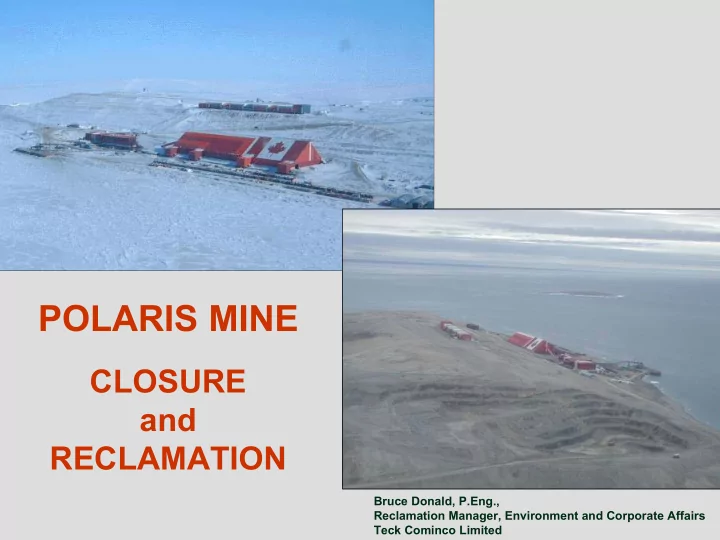

POLARIS MINE CLOSURE and RECLAMATION Bruce Donald, P.Eng., Reclamation Manager, Environment and Corporate Affairs Teck Cominco Limited
Presentation Agenda Presentation Agenda � Introduction � Mine Site Components � Site Reclamation
INTRODUCTION LOCATION � Approximately 100 km northwest of Resolute Bay, Nunavut � 75 o N & 97 o W � Flying time from Yellowknife approx. 2 hrs by 737
Iqaluit Yellowknife
INTRODUCTION MINERALIZATION � ORE – Galena (lead sulphide) – Sphalerite (zinc sulphide) � Host Rock – Limestone � Important Characteristics of Ore Body – Non-Acid Generating – Enclosed Within Continuous Permafrost
INTRODUCTION WEATHER CONDITIONS � Mean annual air temperature -17 0 C � Average Precipitation – 250mm of which 200 is snow � Average of 8 frost free days per year � Temperatures range from about a high of 15 to a low of -50 0 C � Average wind speed of 20 km/hr � Snow melts starting early June, returns mid August.
INTRODUCTION PHYSICAL SETTING � Terrain – Very gently rolling hills � Overburden is a thin mantle over calcareous rocks. Surface material in the area of the mine is classed as a barren gravel � Vegetation – Arctic Tundra in clusters or as a dense mat and is low lying due to the harsh climate, high winds, and shallow soils.
INTRODUCTION HISTORY OF SITE � 1960 Discovery of lead-zinc deposit � 1973 Resource of 25 million tons grading 14% zinc & 4% lead defined � 1981 – Mine started production � 2002 – Ore body exhausted � 2002 - 2004 Decommissioning & reclamation � 2005 - 2011 Site monitoring.
MINE SITE COMPONENTS � Mine Workings � Processing Facilities / Concentrate Storage � Deep Sea Dock / Ship Loading � Tailings Disposal System � Accommodations Complex � Fuel Storage / Distribution System � Landfills � Freshwater System � Roads / Other Services
MINE SITE COMPONENTS Mine Workings � Underground � 4 portals � Raisebore Holes � Subsidence Area � Open Pits � North Pit – small outcrop mined by open pit � LRD Limestone Quarry – rock for CRF � New Quarry – overburden for roads, etc.
MINE WORKINGS
PROCESSING FACILITIES � BARGE CONTAINS � Concentrator � Offices � Warehouse � Dry � PRODUCT STORAGE BUILDING
PROCESSING FACILITIES
PROCESSING FACILITIES Demolition / Re-Grading
PROCESSING FACILITIES
DEEP SEA DOCK / LOADING FACILITIES
DEEP SEA DOCK / LOADING FACILITIES Dock Demolition
TAILINGS DISPOSAL SYSTEM � Tailings Lines between Mill & Thickener � Thickener Building � Tailings Lines between Thickener and Garrow Lake � Garrow Dam
TAILINGS DISPOSAL SYSTEM
TAILINGS DISPOSAL SYSTEM Thickener Building Demolition
TAILINGS DISPOSAL SYSTEM Decommissioning of Garrow Lake Dam
ACCOMMODATIONS
ACCOMMODATIONS Accommodation Building Demolition
FUEL STORAGE FUEL STORAGE
FUEL STORAGE FUEL STORAGE Tank Farm Demolition Tank Farm Demolition
LANDFILLS
LANDFILLS Capping Nearing Completion
FRESH WATER SYSTEM FRESH WATER SYSTEM
ROADS
SITE RECLAMATION CLOSURE PLAN ESTABLISHED CONSIDERING: Requirements in Water Licence and Land � Leases NWT Reclamation Policy � Corporate Environmental Policy Guide � Feed-back from Consultants, Regulators � & Local Communities
SITE RECLAMATION OBJECTIVES OF CLOSURE PLAN � To provide a working document that addresses the concerns and requirements of the stakeholders � Reclaim the site to a condition that health & safety of the public and the environment are protected. � Reclamation to minimize or eliminate long term maintenance and monitoring. � To return the site to an aesthetically acceptable condition.
SITE RECLAMATION LIMITATIONS OF TK Area not highly used for hunting so � interest in area limited Nearest resident population not � indigenous to area so knowledge is based on recent history Issues from local community were � primarily economic rather than environmental or hunting issues.
DETERMINING RECLAMATION STANDARDS SITE SPECIFIC STANDARDS � Soils quality standards based on southern conditions that were not applicable to the north. � Used risk based standards based on local knowledge of site usage � Weather / Climate conditions were key in developing strategies
OTHER LIMITATIONS � SCIENTIFIC � Limited baseline studies from before mine built � Uncertainty of Global warming � REGULATORY � Changing regulatory jurisdiction � Changing environmental standards � Changing bonding standards
BIGGEST CHALLENGES FINANCIAL � Costs in the far north are extremely high. REGULATORY � Due to climate and costs, there are tight time frames for completing work. Decisions generally require Board approval rather than staff approvals for even simple changes which creates delays. WEATHER � Transportation costs and transportation delays were one of the most significant challenges. SKILLS � Local manpower was generally less skilled than would utilize in a southern project. For short duration work having to train on the job is a significant deterrent to local hire.
TEMPORARY ACCOMMODATIONS
AUGUST 25, 2004 – ALMOST DONE!
Recommend
More recommend